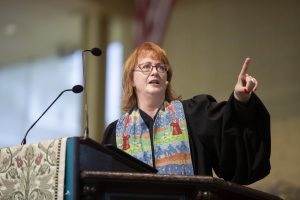
MHARI SHAW/STAFF PHOTOGRAPHER
Why not let out a peal of laughter while in a religious sanctuary?
While the renowned theologian, ethicist and professor Reinhold Niebuhr would say that there’s no place for that sort of chicanery in a church setting, the Rev. Susan Sparks has a distinctly different view on the subject.
“The irony of this is that I went to Union Theological Seminary, and Niebuhr was a great voice that came out of that institution,” said Sparks, an author, Baptist minister and stand-up comedian. “And I lived on Reinhold Niebuhr Boulevard. It’s kind of funny because I ended up writing a thesis on humor and religion, which boiled down to ‘Niebuhr was wrong.’ ”
According to Sparks, Niebuhr believed that laughter had no place in “the holy of holies,” and that “humor was not appropriate in the presence of God.”
At 2 p.m. today in the Hall of Philosophy, Sparks will voice her dissent to Niebuhr’s views in her interfaith lecture, “What’s So Funny about Religion from a Christian Perspective: Reinhold Niebuhr Was Wrong.” Sparks’ lecture is the third in the Week Six interfaith lecture series, “What’s So Funny About Religion?”
“My lecture is about the power of humor, not only within the world and religious sanctuaries themselves, but most importantly within the holy of holies: humor with God, in the presence of God,” Sparks said. “And I’ll go through all the reasons for that, whether it’s the history of the church or Scripture. I end up talking about the practical, healing power of humor.”
That healing power comes in “many different levels,” according to Sparks.
“I’m a breast cancer survivor,” she said. “I found that (humor) was an incredible healing tool not only psychologically, but also physically. There are articles that talk about how the oxygen it takes to laugh lowers blood pressure, increases endorphins and accelerates healing.”
But that healing power isn’t only limited to the physical — Sparks said that humor helps with spiritual healing, too.
“It’s ‘love your neighbor as yourself,’ ” she said. “Humor helps us reconcile with others because it helps us find the commonalities we have with our brothers and sisters. It’s the one thing where, if you laugh with somebody, if you share something, it brings perspective and reconciliation.”
According to Sparks, her career as a trial lawyer developed from an initial desire to be a preacher.
“I grew up in a Southern Baptist church, and they do not ordain women to this day, in 2019,” she said. “So when I was about 7, that got shut down. I ended up taking the same skill set and putting it in a different job. Because really, preachers and lawyers are the same job, just different clients. It’s all about counseling, persuasion, defending or supporting a cause and communication skills.”
Sparks eventually realized she had been denied a life as a preacher not by God, but by God’s “P.R. reps.”
“I started studying stand-up as a trial lawyer,” she said. “I realized I was the only woman doing trial law in Atlanta at that time, and the ‘good ol’ boys’ were able to get a jury’s attention because they were funny. So I started studying stand-up in order to be a better trial lawyer.”
Sparks said that when she arrived at the seminary, things got more complicated for her.




